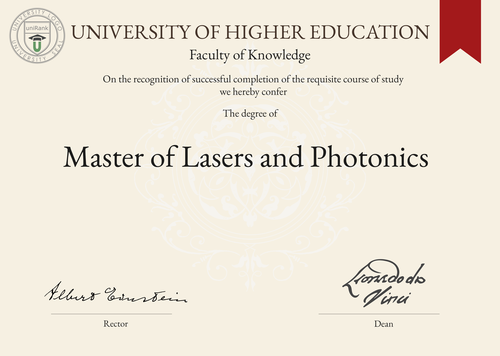
Master of Lasers and Photonics (M.L.P.)
Guide to Master of Lasers and Photonics Program/Course/Degree
Master of Lasers and Photonics (M.L.P.)

Program Name:
Master of Lasers and PhotonicsProgram or Degree abbreviation:
M.L.P.Duration range:
The duration of the program typically ranges from 1 to 2 years.Tuition range:
The tuition fees for the program can vary depending on the country and university, ranging from $10,000 to $30,000 per year.Overview:
The Master of Lasers and Photonics program is designed to provide students with a comprehensive understanding of the principles and applications of lasers and photonics. It focuses on the study of light and its interaction with matter, enabling students to develop expertise in areas such as laser technology, optical communications and photonics engineering.Curriculum Overview by year:
- Year 1: Introduction to Lasers, Optics and Photonics, Laser Systems and Applications, Optical Communications, Electromagnetic Waves and Optoelectronics. - Year 2: Advanced Laser Physics, Photonics Engineering, Laser Spectroscopy, Optical Fiber Technology, Research Project.Key Components:
- In-depth study of laser technology and its applications. - Understanding of optical communications and photonics engineering. - Hands-on experience with laser systems and optical devices. - Research project to apply theoretical knowledge in practical settings.Career Prospects:
Graduates of the Master of Lasers and Photonics program can pursue various career paths in industries such as telecommunications, manufacturing, healthcare and research institutions. They can work as laser engineers, photonics researchers, optical communications specialists, or pursue further academic studies.Salary Expectations:
The salary expectations for graduates of the program can vary depending on factors such as job position, industry and location. On average, professionals in the field of lasers and photonics can earn between $60,000 and $100,000 per year. For a more accurate understanding of salary expectations, you can utilize the Job Sites Search Engine, from our sister site jobRank, which searches over 4,600 job sites worldwide. Make sure to specify not only the job title but also the country you are interested in.Conclusions:
It is important to note that the duration, tuition fees, curriculum, key components, career prospects and salary expectations of the Master of Lasers and Photonics program can vary depending on the chosen country or location for studying the program, as well as the chosen university. Prospective students are advised to research and compare different universities and countries to find the best fit for their academic and career goals. Visitors interested in pursuing a Master of Lasers and Photonics degree anywhere in the world can utilize the uniRank World Universities Search Engine to search for universities offering this specific degree program. This search engine provides a comprehensive database of universities worldwide, making it easier for individuals to find the right educational institution for their desired program.World Universities Search Engine
search for Master of Lasers and Photonics (M.L.P.) and add the Location (country, state etc.) or specific University you are interested in studying at.
Query examples:
- Master of Lasers and Photonics (M.L.P.) United States
- Master of Lasers and Photonics (M.L.P.) United Kingdom online
- Master of Lasers and Photonics (M.L.P.) Australia international students
- Master of Lasers and Photonics (M.L.P.) University of California
- Master of Lasers and Photonics (M.L.P.) University of London tuition fees
- Master of Lasers and Photonics (M.L.P.) University of Sydney scholarships
Share Program/Course
Interesting? Share this program/course/degree info with your friends now.